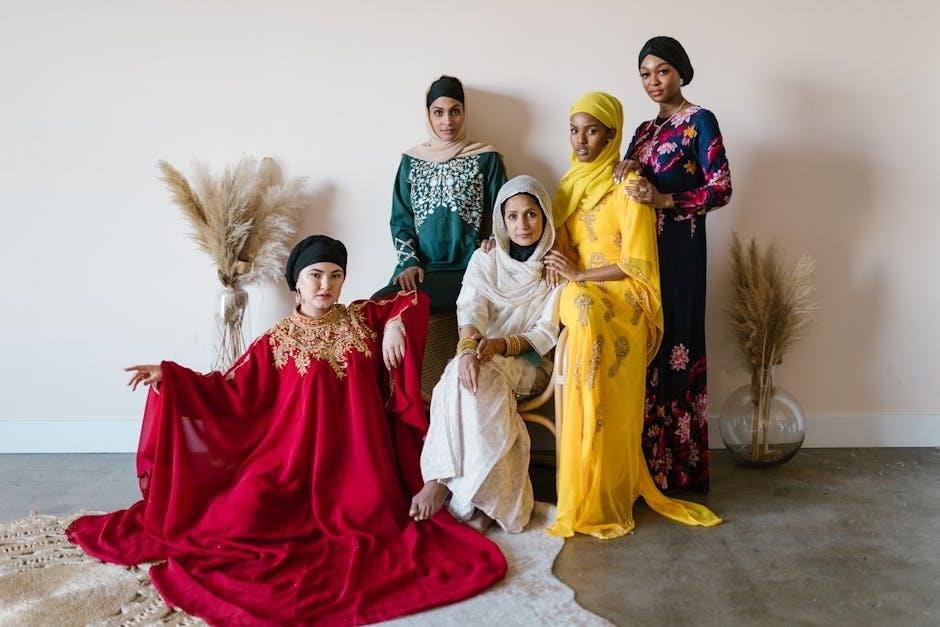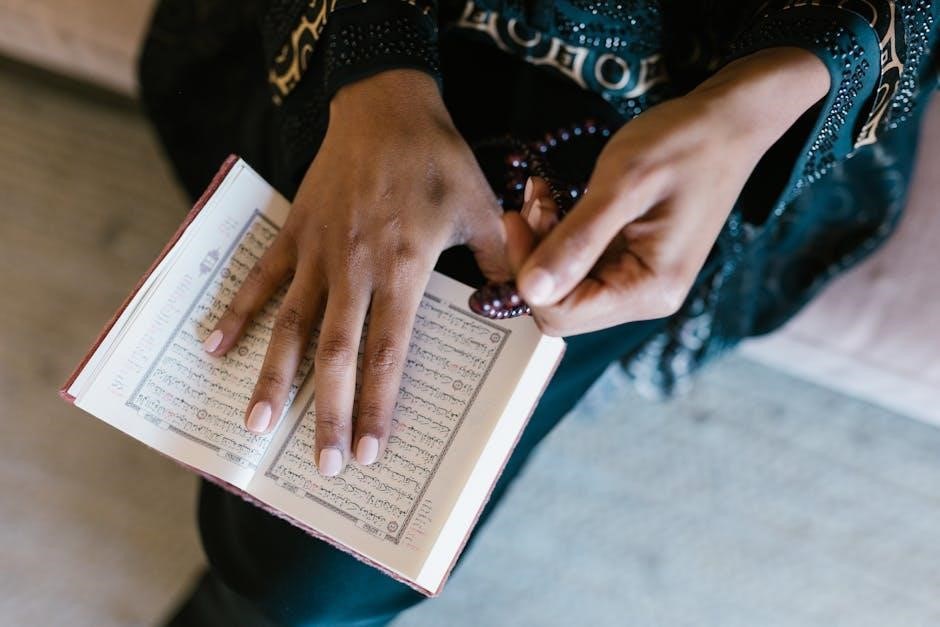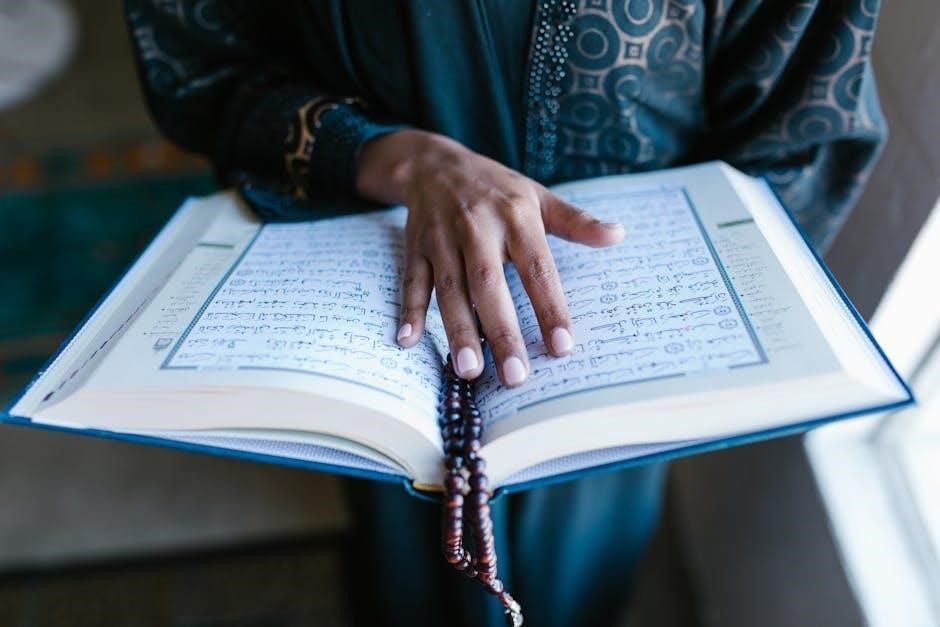Islamic manners, as outlined in Shaykh Abdul Fattah Abu Ghuddah’s book, provide a comprehensive guide to essential etiquette in Islam, emphasizing their significance in shaping a Muslim’s character and daily interactions; Available in PDF and other formats, this resource is invaluable for understanding and implementing these timeless principles. It serves as a foundation for personal and societal harmony, reflecting the teachings of the Prophet Muhammad (peace be upon him) and the Quran. By adhering to these manners, Muslims can cultivate a noble and compassionate personality, fostering a deeper connection with their faith and community. This book is a vital tool for every Muslim seeking to embody the true spirit of Islam in their everyday lives. Its concise yet profound insights make it accessible to readers of all ages and backgrounds, ensuring the preservation and practice of Islamic adab for future generations. The text is both a reminder and a guide, encouraging believers to uphold the moral and ethical standards prescribed by Islamic teachings. Through its teachings, the book aims to inspire a transformation in individuals, leading to a more righteous and harmonious society.
Overview of the Book “Islamic Manners” by Shaykh Abdul Fattah Abu Ghuddah

Shaykh Abdul Fattah Abu Ghuddah’s Islamic Manners is a concise yet profound guide to fundamental Islamic etiquette, covering essential aspects of a Muslim’s behavior. Written by a prominent 20th-century scholar, the book emphasizes the importance of adab (manners) in daily life, drawing from authentic hadiths and Islamic teachings. It is structured into nine chapters, each addressing specific areas such as the scope of Islamic manners, the significance of appearance, and interactions with others. Available in PDF and other formats, the book is a vital resource for Muslims seeking to embody the moral and ethical standards of Islam. Abu Ghuddah’s work serves as a reminder of the transformative power of proper etiquette, inspiring readers to cultivate a noble and compassionate character. Its accessible format makes it a valuable tool for personal growth and communal harmony. The book remains a timeless guide for adhering to Islamic values in a modern world.

The Importance of Adab (Manners) in Islam
Adab, or Islamic manners, holds a central place in Islam, reflecting the faith’s emphasis on moral and ethical excellence. It encompasses not only outward behavior but also inner righteousness, shaping a Muslim’s character and interactions. Proper adab is seen as a means of pleasing Allah and earning His mercy, as it mirrors the noble attributes of the Prophet Muhammad (peace be upon him). By practicing Islamic manners, believers foster harmony in their personal and social lives, contributing to a more compassionate and just society. Shaykh Abdul Fattah Abu Ghuddah highlights that these etiquettes are not merely optional but essential for living a righteous life. They beautify a Muslim’s character, making their personality attractive and a source of inspiration to others. Adherence to adab is thus a fundamental aspect of worship, integral to spiritual growth and communal cohesion. It is through these manners that Islam’s universal message of peace and kindness is exemplified.

Key Concepts in Islamic Manners
Islamic manners, as detailed in Shaykh Abdul Fattah Abu Ghuddah’s work, emphasize modesty, humility, and kindness. These concepts form the foundation of a Muslim’s ethical conduct, guiding interactions in daily life and fostering a balanced, virtuous lifestyle. The book highlights the significance of these principles in maintaining harmony and dignity, both individually and socially. By adhering to these teachings, believers cultivate a personality that reflects the true spirit of Islam, embodying compassion and moral excellence in all aspects of life. These key concepts serve as a guiding light for Muslims, ensuring their actions align with the divine teachings of the Quran and Sunnah. The text underscores the transformative power of proper adab in shaping a righteous and upright Muslim character. This section provides a clear roadmap for implementing these timeless principles in contemporary life, ensuring their relevance and application remain steadfast. Through these manners, Islam promotes a holistic approach to living, where faith and practice are seamlessly intertwined. The book’s insights are invaluable for those seeking to deepen their understanding and practice of Islamic etiquette, offering practical wisdom for everyday situations. By embracing these key concepts, Muslims can strive toward a life of moral integrity and spiritual fulfillment. The teachings of Shaykh Abdul Fattah Abu Ghuddah remind us that Islamic manners are not merely a set of rules but a way of life that honors Allah and benefits humanity. This section is a testament to the enduring importance of adab in Islam, encouraging believers to embody these values in their thoughts, words, and actions. The clarity and depth of the book make it an essential resource for anyone seeking to live a life pleasing to Allah. The emphasis on kindness, respect, and humility underscores the universal appeal of Islamic manners, transcending cultural and temporal boundaries. The book’s focus on practical application ensures that these concepts remain accessible and actionable for readers of all backgrounds. Through its teachings, the book inspires a renewed commitment to the ethical and moral standards prescribed by Islam, fostering a community of believers who embody the beauty of their faith. The key concepts outlined in this section serve as a powerful reminder of the transformative impact of Islamic manners on personal and societal well-being. The book’s message is one of hope and guidance, offering readers the tools to cultivate a life of moral excellence and spiritual growth. The timeless wisdom of Shaykh Abdul Fattah Abu Ghuddah continues to inspire Muslims worldwide, emphasizing the enduring relevance of Islamic manners in modern life. This section is a vital part of the book, providing readers with a clear understanding of the core principles of Islamic etiquette and their significance in the Muslim faith. By studying these key concepts, believers can gain a deeper appreciation for the comprehensive nature of Islam’s teachings on morality and conduct. The book’s emphasis on the practical application of these principles ensures that readers are equipped with the knowledge and motivation to implement them in their daily lives. Through this section, Shaykh Abdul Fattah Abu Ghuddah offers a profound exploration of the essential virtues that define a Muslim’s character, providing a roadmap for spiritual and moral growth. The teachings in this section are a testament to the richness and depth of Islamic tradition, offering insights that are as relevant today as they were in the past. The book’s focus on the key concepts of Islamic manners ensures that readers are well-equipped to navigate the challenges of modern life with grace, dignity, and faith. The clarity and wisdom of the author’s words make this section a valuable resource for anyone seeking to deepen their understanding of Islamic etiquette and its role in shaping a virtuous life. Through this section, readers are reminded of the profound impact that proper adab can have on their relationships, communities, and spiritual journeys. The book’s emphasis on the importance of Islamic manners serves as a powerful call to action, encouraging believers to embody these principles in all aspects of their lives. The key concepts outlined in this section provide a foundation for a life of moral integrity, compassion, and devotion, reflecting the universal values of Islam. The teachings of Shaykh Abdul Fattah Abu Ghuddah continue to inspire and guide Muslims, offering a pathway to a life that is pleasing to Allah and beneficial to humanity. This section is a vital component of the book, ensuring that readers gain a comprehensive understanding of the essential manners and etiquettes prescribed by Islam. By embracing these key concepts, Muslims can strive toward a life of balance, harmony, and spiritual fulfillment, embodying the true spirit of their faith. The book’s insights are a reminder that Islamic manners are not just a set of rules but a way of life that honors Allah and promotes the well-being of all people. The timeless wisdom of Shaykh Abdul Fattah Abu Ghuddah ensures that this section remains a valuable resource for generations of Muslims seeking to live a life of moral excellence and spiritual growth. The key concepts outlined in this section are a testament to the enduring relevance of Islamic manners in guiding believers toward a life of righteousness and virtue. Through this section, readers are inspired to embody the principles of modesty, humility, and kindness, fostering a community of believers who reflect the beauty of Islam. The book’s focus on the practical application of these concepts ensures that readers are equipped with the knowledge and motivation to implement them in their daily lives. The teachings of Shaykh Abdul Fattah Abu Ghuddah remind us that Islamic manners are a source of strength, guiding believers through the challenges of life with grace and dignity. This section is a powerful reminder of the transformative impact of proper adab on personal and societal well-being, encouraging readers to embrace these principles wholeheartedly. The book’s emphasis on the key concepts of Islamic manners ensures that readers are well-prepared to navigate the complexities of modern life with faith, integrity, and compassion. The timeless wisdom of the author’s words continues to inspire and guide Muslims, offering a pathway to a life of moral excellence and spiritual fulfillment. Through this section, readers are reminded of the profound significance of Islamic manners in shaping a life that is pleasing to Allah and beneficial to humanity. The key concepts outlined in this section provide a clear roadmap for embodying the ethical and moral standards prescribed by Islam, fostering a community of believers who reflect the true spirit of their faith. The book’s insights are a valuable resource for anyone seeking to deepen their understanding of Islamic etiquette and its role in shaping a virtuous life. By embracing these key concepts, Muslims can strive toward a life of balance, harmony, and spiritual growth, embodying the universal values of Islam. The teachings of Shaykh Abdul Fattah Abu Ghuddah continue to inspire and guide believers, offering a profound exploration of the essential virtues that define a Muslim’s character. This section is a vital part of the book, ensuring that readers gain a comprehensive understanding of the core principles of Islamic manners and their significance in the Muslim faith. Through this section, readers are inspired to embody the principles of modesty, humility, and kindness, fostering a community of believers who reflect the beauty of Islam. The book’s focus on the practical application of these concepts ensures that readers are equipped with the knowledge and motivation to implement them in their daily lives. The timeless wisdom of the author’s words continues to inspire and guide Muslims, offering a pathway to a life of moral excellence and spiritual growth. The key concepts outlined in this section are a testament to the enduring relevance of Islamic manners in guiding believers toward a life of righteousness and virtue. This section is a powerful reminder of the transformative impact of proper adab on personal and societal well-being, encouraging readers to embrace these principles wholeheartedly. The book’s emphasis on the key concepts of Islamic manners ensures that readers are well-prepared to navigate the complexities of modern life with faith, integrity, and compassion. The teachings of Shaykh Abdul Fattah Abu Ghuddah remind us that Islamic manners are a source of strength, guiding believers through the challenges of life with grace and dignity. Through this section, readers are reminded of the profound significance of Islamic manners in shaping a life that is pleasing to Allah and beneficial to humanity. The key concepts outlined in this section provide a clear roadmap for embodying the ethical and moral standards prescribed by Islam, fostering a community of believers who reflect the true spirit of their faith. The book’s insights are a valuable resource for anyone seeking to deepen their understanding of Islamic etiquette and its role in shaping a virtuous life. By embracing these key concepts, Muslims can strive toward a life of balance, harmony, and spiritual growth, embodying the universal values of Islam. The teachings of Shaykh Abdul Fattah
The Scope of Islamic Manners and Their Significance

The scope of Islamic manners, as discussed in Shaykh Abdul Fattah Abu Ghuddah’s book, encompasses all aspects of life, from personal conduct to social interactions. These manners are not limited to religious rituals but extend to daily activities, ensuring a holistic approach to living a virtuous life. The significance lies in their role in fostering harmony, respect, and moral excellence within individuals and society. By adhering to these guidelines, Muslims cultivate a balanced and dignified lifestyle that reflects the teachings of Islam. The book emphasizes that Islamic manners are essential for achieving spiritual growth, strengthening relationships, and promoting a sense of community. They serve as a foundation for ethical behavior, guiding believers in their interactions with others and in their worship of Allah. The teachings highlight the importance of humility, kindness, and modesty, demonstrating how these traits contribute to a life of moral integrity and divine pleasure. The scope of Islamic manners is universal, applying to every situation and person, ensuring that Muslims embody the true spirit of their faith in all circumstances. Through these principles, Islam provides a comprehensive framework for living a life that is both personally fulfilling and socially beneficial. The significance of these manners is further underscored by their ability to foster inner peace and outward harmony, creating a balanced and righteous individual. This section of the book underscores the transformative power of Islamic etiquette in shaping a life that honors Allah and benefits humanity. By understanding and implementing these manners, Muslims can achieve a higher level of spiritual and moral excellence, embodying the sublime character of the Prophet Muhammad (peace be upon him). The teachings of Shaykh Abdul Fattah Abu Ghuddah serve as a timeless reminder of the enduring relevance of Islamic manners in guiding believers toward a life of righteousness and virtue. The scope of these manners is vast, covering every facet of life, while their significance lies in their ability to promote a balanced, compassionate, and god-conscious lifestyle. Through this section, readers gain a deeper appreciation for the integral role of Islamic etiquette in achieving personal and societal well-being. The book’s insights are a powerful call to action, encouraging believers to embrace these timeless principles and live a life that reflects the beauty of Islam. The scope and significance of Islamic manners, as outlined in this section, provide a clear pathway for Muslims to embody the ethical and moral standards prescribed by their faith, fostering a life of harmony, dignity, and spiritual growth. The teachings of Shaykh Abdul Fattah Abu Ghuddah remind us that Islamic manners are not merely a set of rules but a way of life that honors Allah and benefits humanity. The significance of these principles is further highlighted by their ability to transcend cultural and temporal boundaries, offering universal guidance for all believers. By adhering to these manners, Muslims can cultivate a personality that is both noble and compassionate, reflecting the true spirit of Islam. This section of the book is a vital resource for anyone seeking to deepen their understanding of Islamic etiquette and its role in shaping a virtuous life. The scope of Islamic manners is comprehensive, covering every aspect of life, while their significance lies in their ability to promote a life of moral excellence, spiritual growth, and social harmony. Through this section, readers are inspired to embody the principles of humility, kindness, and modesty, fostering a community of believers who reflect the beauty of their faith. The teachings of Shaykh Abdul Fattah Abu Ghuddah serve as a profound reminder of the transformative impact of proper adab on personal and societal well-being. The scope and significance of Islamic manners, as outlined in this section, provide a clear roadmap for achieving a life of balance, harmony, and spiritual fulfillment. The book’s emphasis on these principles ensures that readers are well-equipped to navigate the challenges of modern life with faith, integrity, and compassion. The timeless wisdom of the author’s words continues to inspire and guide Muslims, offering a pathway to a life of moral excellence and spiritual growth. Through this section, readers gain a deeper understanding of the essential role of Islamic manners in shaping a life that is pleasing to Allah and beneficial to humanity. The significance of these principles is further underscored by their ability to foster a sense of community and shared values among believers, promoting a harmonious and righteous society. The teachings of Shaykh Abdul Fattah Abu Ghuddah remind us that Islamic manners are a source of strength and guidance, helping believers to navigate the complexities of life with grace and dignity. This section is a powerful reminder of the enduring relevance of Islamic etiquette in guiding believers toward a life of virtue and moral integrity. The scope of these manners is vast, encompassing all aspects of life, while their significance lies in their ability to promote a balanced and compassionate lifestyle. Through this section, readers are inspired to embody the principles of Islamic manners, fostering a life of spiritual growth, moral excellence, and social harmony. The book’s insights are a valuable resource for anyone seeking to deepen their understanding of Islamic etiquette and its role in shaping a virtuous life. By embracing these principles, Muslims can strive toward a life of balance, harmony, and spiritual fulfillment, reflecting the universal values of Islam. The teachings of Shaykh Abdul Fattah Abu Ghuddah continue to inspire and guide believers, offering a profound exploration of the essential virtues that define a Muslim’s character. This section is a vital part of the book, ensuring that readers gain a comprehensive understanding of the core principles of Islamic manners and their significance in the Muslim faith. Through this section, readers are reminded of the profound impact that proper adab can have on their relationships, communities, and spiritual journeys. The book’s emphasis on the significance of Islamic manners serves as a powerful call to action, encouraging believers to embody these principles in all aspects of their lives. The key concepts outlined in this section provide a foundation for a life of moral integrity, compassion, and devotion, reflecting the universal values of Islam. The teachings of Shaykh Abdul Fattah Abu Ghuddah continue to inspire and guide Muslims, offering a pathway to a life that is pleasing to Allah and beneficial to humanity. This section is a testament to the enduring importance of Islamic manners in shaping a life of righteousness and virtue. By adhering to these principles, believers can achieve a higher level of spiritual and moral excellence, embodying the sublime character of the Prophet Muhammad (peace be upon him). The significance of Islamic manners is further underscored by their ability to foster inner peace and outward harmony, creating a balanced and righteous individual. This section of the book underscores the transformative power of Islamic etiquette in shaping a life that honors Allah and benefits humanity. Through this section, readers gain a deeper appreciation for the integral role of Islamic etiquette in achieving personal and societal well-being. The book’s insights are a powerful call to action, encouraging believers to embrace these timeless principles and live a life that reflects the beauty of Islam. The scope and significance of Islamic manners, as outlined in this section, provide a clear pathway for Muslims to embody the ethical and moral standards prescribed by their faith, fostering a life of harmony, dignity, and spiritual growth. The teachings of Shaykh Abdul Fattah Abu Ghuddah remind us that Islamic manners are not merely a set of rules but a way of life that honors Allah and benefits humanity. The significance of these principles is further highlighted by their ability to transcend cultural and temporal boundaries, offering universal guidance for all believers. By adhering to these manners, Muslims can cultivate a personality that is both noble and compassionate, reflecting the true spirit of Islam. This section of the book is a vital resource for anyone seeking to deepen their understanding of Islamic etiquette and its role in shaping a virtuous life. The scope of Islamic manners is comprehensive, covering every aspect of life, while their significance lies in their ability to promote a life of moral excellence, spiritual growth, and social harmony. Through this section, readers are inspired to embody the principles of humility, kindness, and modesty, fostering a community of believers who reflect the beauty of their faith. The teachings of Shaykh Abdul Fattah Abu Ghuddah serve as a profound reminder of the transformative impact of proper adab on personal and societal well-being. The scope and significance of Islamic manners, as outlined in this section,
Essential Virtues and Traits for Every Muslim
Shaykh Abdul Fattah Abu Ghuddah’s book emphasizes essential virtues and traits that every Muslim should cultivate. These include humility, modesty, truthfulness, and kindness, which form the foundation of a righteous character. The book highlights the importance of patience, gratitude, and forgiveness, stressing their role in strengthening one’s relationship with Allah and others. It also underscores the value of justice, fairness, and compassion in all interactions. These traits, inspired by the Prophet Muhammad’s (peace be upon him) exemplary character, are not only moral guidelines but also a means of earning divine pleasure. By embodying these virtues, Muslims can achieve spiritual growth, foster harmonious relationships, and reflect the true spirit of Islam in their daily lives. The book serves as a reminder of the enduring importance of these traits in shaping a noble and upright Muslim personality.

Leave a Reply
You must be logged in to post a comment.